|
M. Greenburg's
Sons
- San Francisco, CA
Morris Greenberg was the inventor of the "California" wet barrel fire hydrant. Learn more about Greenberg fire hydrants by visiting the following link : http://www.sfmuseum.org/hist8/greenberg.html Click to see the cover of a 1920s Greenberg hydrant catalog. Except as noted, restored hydrants are from the Willis Lamm Collection. Locations indicated are where the hydrants were originally in service. |
| Click pictures for closeups |
| The first "California" hydrants were short. Often they were installed in areas where houses had no plumbing, so many had threaded connections on the bonnets to which "street washers" (valves where people could fill buckets) were attached. |
|
FHO# 0617 Model: 71 Date: 1907 Location: Oakland, CA Photo: © 2000, Willis Lamm
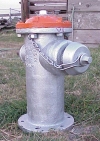
|
FHO# 0617b View: Street Washer Tap Date: 1907 Location: Oakland, CA Photo: © 2000, Willis Lamm
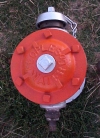
|
FHO# 0543 Model: 72 Date: 1905 Location: Oakland, CA Photo: © 2000, Willis Lamm
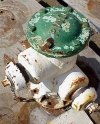
|
| Click pictures for closeups |
| Around the turn of the century some improvements were made. Hydrants became taller which made it easier to turn spanners on the valve stems. "Horse balls" were installed whereupon the engine driver could tie off his fire horses at a hydrant a safe distance from the fire after unhitching them from the steamer engine. |
FHO# 0585 Model: 73 Date: 1907 Location: Concord, CA Photo: © 2000, Willis Lamm
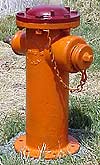
|
FHO# 0525 Model: SFFD 74 (horse ball) Date: ca.1900 Location: San Francisco, CA Photo: © 2000, Luis da Silva

|
|
FHO# 0514 Model: 74 Date: 1910 Location: Pittsburg, CA Photo: © 2000, Willis Lamm
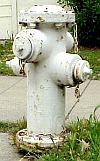
|
FHO# 0524 Model: SFFD 74 Date: 1911s Location: San Francisco, CA Photo: © 2000, Willis Lamm
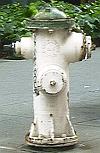
|
FHO# 0528 Model: SFFD 74 Date: 1920s Location: San Francisco, CA Photo: © 2000, Willis Lamm
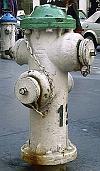
| |
| Greenberg started producing "steamer" port hydrants in the late 1800s. The first series of these hydrants was patterned after the Model 72, a short two outlet hydrant. The operating nut for the steamer outlet was only 9" above the base flange so these hydrants had to be mounted on extensions so that spanners could turn completely around. Later models had the lowest operating nut at least 12 inches above the flange. |
FHO# 0583 Model:75 (early version) Date: 1907 Location: Richmond, CA Photo: © 2001, Willis Lamm
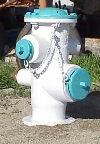
| ||
|
FHO# 0645 Model: LA 75 Date: 1910 Location: Los Angeles, CA Photo: © 2000, Willis Lamm

|
FHO# 0628 Model: Bakersfield 75 Date: 1928 Location: Bakersfield, CA Photo: © 2001, Willis Lamm
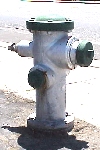
|
FHO# 0657 Model: Bakersfield 75 Date: 1937 Location: Bakersfield, CA Photo: © 2001, Willis Lamm
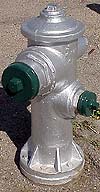 Closeup of Stem Protector | |